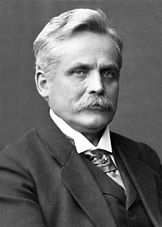- Wilhelm Wien
Infobox_Scientist
name = Wilhelm Wien

image_width =150
caption = Wilhelm Carl Werner Otto Fritz Franz Wien
birth_date = birth date|1864|1|13|df=y
birth_place =Fischhausen , East Prussia
death_date = death date and age|1928|8|30|1864|1|13|df=y
death_place =Munich ,Germany
residence =Germany
nationality = German
field =Physicist
work_institution =University of Giessen University of Würzburg University of Munich RWTH Aachen University
alma_mater =University of Göttingen University of Berlin
doctoral_advisor =Hermann von Helmholtz
doctoral_students =Karl Hartmann
known_for =Blackbody radiation
prizes =Nobel Prize for Physics (1911)
religion =
footnotes =
spouse = Luise Mehler (1898)Wilhelm Carl Werner Otto Fritz Franz Wien (German: IPA-all|/viːn/) (
13 January 1864 –30 August 1928 ) was a German physicist who, in 1893, used theories aboutheat andelectromagnetism to composeWien's displacement law , which relates the maximum emission of ablackbody to itstemperature .As
Max von Laue wrote of Wien, "his immortal glory" was that he "led us to the very gates ofquantum physics ".Wien was awarded the
Nobel Prize for Physics for 1911. A crater on Mars is named in his honor.In 1913 he was invited as an Ernest Kempton Adams Lecturer in Theoretical Physics from
Columbia University .Early life
Wien was born at
Fischhausen (Rybaki),Province of Prussia (now Primorsk, Russia) as the son of landownerCarl Wien . In 1866, his family moved toDrachstein , in Rastenburg (Rastembork).Education
In 1879, Wien went to school in Rastenburg and from 1880-1882 he attended the city school of
Heidelberg . In 1882 he attended theUniversity of Göttingen and theUniversity of Berlin . From 1883-85, he worked in the laboratory ofHermann von Helmholtz and, in 1886, he received his Ph.D. with a thesis on the diffraction oflight upon metals and on the influence of various materials upon thecolor of refracted light.From 1896 to 1899, Wien lectured at the prestigiousAachen University of Technology .In 1900 he went to the University Würzburg and became successor ofWilhelm Conrad Röntgen .Work
In 1896 Wien derived a distribution law of radiation, later named after him
Wien's displacement law . Planck, who was a colleague of Wien's when he was carrying out this work, later, in 1900, basedquantum theory on the fact that Wien's law, while valid at high frequencies, broke down completely at low frequencies. In 1900 (following the work ofGeorge Frederick Charles Searle ), he assumed that the entire mass of matter is of electromagnetic origin and proposed the formula m=(4/3)E/c^2 for the relation between electromagnetic mass and electromagnetic energy.While studying streams of
ionized gas , Wien, in 1898, identified a positive particle equal in mass to thehydrogen atom . Wien, with this work, laid the foundation ofmass spectroscopy .J. J. Thomson refined Wien's apparatus and conducted further experiments in 1913 then, after work byErnest Rutherford in 1919, Wien's particle was accepted and named theproton .Wien received the 1911 Nobel Prize for his work on
heat radiation .Bibliography
*"Lehrbuch der Hydrodynamik" (1900, physics)
*"Aus dem Leben und Wirken eines Physikers" (1930, memoir)ee also
*
Wien's Distribution Law
*History of special relativity
*Mass–energy equivalence References
*Wien, W. (1904) „Über die Differentialgleichungen der Elektrodynamik für bewegte Körper“ / [http://www.wbabin.net/physics/traillwien |"On the differential equations of the electrodynamics for moving bodies"] ; "Annalen der Physik (Series 4)", 13(4), 641-662, 663-668; (but now as "digitized" German text, with parallel "English translation", plus extra references and footnotes). For a facsimile of the original (part 1 only), follow the "Band 318" link from [http://www.weltderphysik.de/de/3001.php] .
*cite journal
title = Zur Erinnerung an Wilhelm Wien bei der 25. Wiederkehr seines Todestages
author = E. Rüchardt
journal = Naturwissenschaften
volume = 42
issue = 3
pages = 57–62
year = 1955
url =
doi = 10.1007/BF00589524
*cite journal
title = Zur Entdeckung der Kanalstrahlen vor fünfzig Jahren
author = E. Rüchardt
journal = Naturwissenschaften
volume = 24
issue = 30
pages = 57–62
year = 1936
url =
doi = 10.1007/BF01473963External links
* [http://www.nobel-winners.com/Physics/wilhelm_wien.html Wilhelm Wien]
*Persondata
NAME= Wien, Wilhelm
ALTERNATIVE NAMES=
SHORT DESCRIPTION=Physicist
DATE OF BIRTH=January 13 ,1864
PLACE OF BIRTH=Fischhausen , East Prussia
DATE OF DEATH=August 30 ,1928
PLACE OF DEATH=Munich ,Germany
Wikimedia Foundation. 2010.
